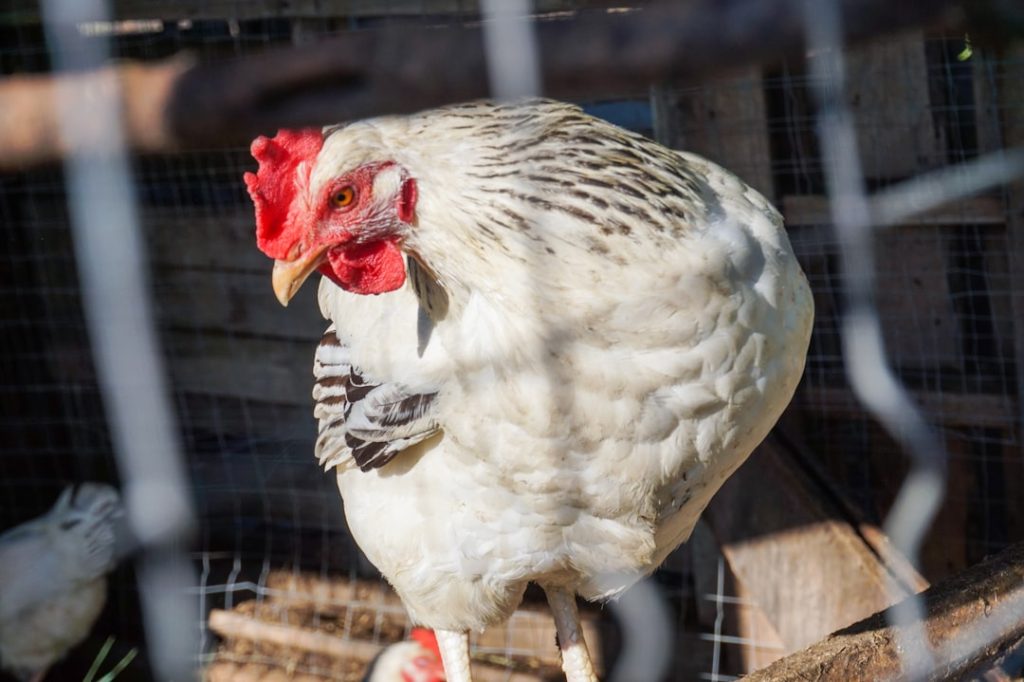Chickens are social creatures with a diverse range of behaviors. Their natural curiosity drives them to explore their environment, including areas they should not enter, such as porches. As opportunistic feeders, chickens actively search for food in various locations, which may lead them to porches where they might find crumbs or food scraps.
Chickens also tend to develop habits, often returning to places where they have previously found food or shelter. Understanding these behavioral patterns is essential for developing effective strategies to prevent chickens from accessing porches. Within a flock, chickens establish a hierarchical structure known as a pecking order, where dominant individuals assert authority over others.
This social dynamic can result in aggressive behavior, particularly if chickens feel threatened or perceive the porch as part of their territory. Homeowners who comprehend these natural behaviors are better equipped to anticipate and address potential issues related to chickens accessing their porch.
Table of Contents
- 1 Designing a Barrier to Prevent Access to the Porch
- 2 Creating a Distraction to Redirect the Chickens
- 3 Implementing Regular Cleaning and Maintenance
- 4 Using Natural Repellents to Deter Chickens
- 5 Training and Conditioning the Chickens’ Behavior
- 6 Seeking Professional Advice and Assistance
- 7 FAQs
- 7.1 What are some effective methods for keeping chickens from pooping on the porch?
- 7.2 Why do chickens tend to poop on the porch?
- 7.3 How can I train my chickens to avoid pooping on the porch?
- 7.4 Are there any natural repellents that can deter chickens from pooping on the porch?
- 7.5 What are the potential health risks associated with chicken poop on the porch?
Key Takeaways
- Chickens are naturally curious and will explore their environment, including porches and other off-limits areas.
- A physical barrier, such as a gate or fence, can effectively prevent chickens from accessing the porch.
- Providing a distraction, such as a designated pecking area or hanging treats, can redirect the chickens’ attention away from the porch.
- Regular cleaning and maintenance of the porch area can help discourage chickens from lingering in that space.
- Natural repellents, such as citrus peels or predator urine, can be used to deter chickens from approaching the porch.
- Training and conditioning can be used to teach chickens to avoid the porch and stay within designated areas.
- Seeking professional advice and assistance, such as from a poultry expert or animal behaviorist, can provide additional strategies for managing chicken behavior.
Designing a Barrier to Prevent Access to the Porch
Designing a Physical Barrier
One effective way to prevent chickens from accessing the porch is to design and install a physical barrier. This can be achieved through the use of fencing, netting, or other materials that create a clear boundary between the chicken’s living area and the porch. The barrier should be tall enough to prevent the chickens from flying or jumping over it, and sturdy enough to withstand any attempts to break through.
Considering Chicken Behavior
When designing a barrier, it’s important to consider the specific behaviors of the chickens in question. For example, if the chickens are known for digging under fences, it may be necessary to bury the barrier underground to prevent them from tunneling their way onto the porch.
Visual Deterrents
Additionally, the barrier should be visually distinct to clearly demarcate the boundary and discourage the chickens from attempting to cross it.
Creating a Distraction to Redirect the Chickens

Another approach to preventing chickens from accessing the porch is to create a distraction that redirects their attention elsewhere. This can be achieved by providing alternative sources of food, water, and entertainment in areas away from the porch. For example, setting up a designated feeding area with a variety of grains and treats can entice the chickens to spend more time in that location rather than on the porch.
In addition to food, providing enrichment activities such as hanging toys or perches can keep the chickens occupied and engaged, reducing their interest in venturing onto the porch. By creating a stimulating environment within their designated living space, homeowners can effectively redirect the chickens’ natural behaviors and discourage them from seeking out the porch as a source of entertainment or sustenance.
Implementing Regular Cleaning and Maintenance
Regular cleaning and maintenance of the chicken’s living area can also help prevent them from accessing the porch. By keeping their coop and surrounding area clean and free of food scraps or other attractants, homeowners can reduce the likelihood of chickens venturing onto the porch in search of sustenance. This can be achieved through daily cleaning of food and water containers, as well as regular removal of waste and debris from the chicken’s living space.
In addition to cleaning, maintaining the structural integrity of the chicken’s enclosure is crucial in preventing them from accessing the porch. This includes repairing any damaged fencing or netting, reinforcing weak spots, and regularly inspecting for signs of wear and tear. By staying on top of cleaning and maintenance tasks, homeowners can create an environment that is less appealing for chickens to leave and explore other areas such as the porch.
Using Natural Repellents to Deter Chickens
In some cases, natural repellents can be used to deter chickens from accessing the porch. This can include planting aromatic herbs or flowers around the perimeter of the porch, such as lavender or marigolds, which are known to repel chickens due to their strong scent. Additionally, sprinkling citrus peels or coffee grounds around the porch can also discourage chickens from venturing into that area.
Another natural deterrent is the use of predator decoys, such as fake owls or hawks, which can create the illusion of danger and discourage chickens from approaching the porch. These visual cues can trigger the chickens’ natural instinct to avoid potential threats, making them less likely to attempt accessing the porch.
Training and Conditioning the Chickens’ Behavior

Positive Reinforcement Techniques
By using positive reinforcement techniques, homeowners can encourage chickens to stay within their designated living area and avoid the porch. This can be achieved by rewarding the chickens with treats or praise when they remain in their designated space. Over time, this reinforcement can help shape the chickens’ behavior and keep them away from the porch.
Negative Reinforcement Techniques
On the other hand, negative reinforcement techniques can be used to discourage chickens from accessing the porch. This can include using deterrents such as water sprays or noise devices when the chickens attempt to cross into prohibited areas.
Consistency is Key
To effectively train and condition the chickens’ behavior, consistency is crucial. Homeowners must consistently apply these techniques to reinforce the desired behavior and prevent the chickens from accessing the porch. With time and patience, this approach can lead to successful behavior modification and a porch free from chickens.
Seeking Professional Advice and Assistance
If all else fails, homeowners may consider seeking professional advice and assistance in preventing chickens from accessing the porch. This can include consulting with animal behaviorists or poultry experts who have experience in addressing similar issues. These professionals can provide valuable insights and recommendations tailored to the specific behaviors and needs of the chickens in question.
In some cases, professional assistance may also involve implementing more advanced deterrents or modifications to the chicken’s living space, such as installing motion-activated sprinkler systems or electronic barriers. By enlisting the help of experts in animal behavior and poultry management, homeowners can gain access to specialized knowledge and resources that can effectively address issues with chickens accessing their porch. In conclusion, preventing chickens from accessing the porch requires a comprehensive understanding of their behavior and needs, as well as proactive measures to deter them from venturing into prohibited areas.
By designing a barrier, creating distractions, implementing regular cleaning and maintenance, using natural repellents, training and conditioning behavior, and seeking professional advice when needed, homeowners can effectively address issues with chickens accessing their porch and create a harmonious living environment for both humans and animals alike.
If you’re looking for more tips on keeping chickens, check out this article on where to put a chicken coop from PoultryWizard.com. It offers valuable advice on the best location for your coop to ensure your chickens are happy and healthy.
FAQs
What are some effective methods for keeping chickens from pooping on the porch?
Some effective methods for keeping chickens from pooping on the porch include using physical barriers such as fencing or netting, providing designated areas for the chickens to roam and forage, and using deterrents such as motion-activated sprinklers or natural repellents.
Why do chickens tend to poop on the porch?
Chickens may poop on the porch due to their natural instinct to roost in elevated areas, as well as their tendency to seek out warm and dry spots for resting. Additionally, chickens may be attracted to the porch if they find food scraps or insects in the area.
How can I train my chickens to avoid pooping on the porch?
Training chickens to avoid pooping on the porch can be achieved through positive reinforcement and redirection. Providing designated areas for the chickens to roam and providing regular access to a clean and spacious coop can also help in training them to avoid the porch.
Are there any natural repellents that can deter chickens from pooping on the porch?
Yes, there are natural repellents such as citrus peels, vinegar, or essential oils that can be used to deter chickens from pooping on the porch. These scents are often unpleasant to chickens and can help discourage them from frequenting the area.
What are the potential health risks associated with chicken poop on the porch?
Chicken poop can contain harmful bacteria such as E. coli and Salmonella, which can pose health risks to humans, especially if they come into contact with the poop or track it into the house. It’s important to keep the porch clean and free of chicken poop to minimize these health risks.
Meet Walter, the feathered-friend fanatic of Florida! Nestled in the sunshine state, Walter struts through life with his feathered companions, clucking his way to happiness. With a coop that’s fancier than a five-star hotel, he’s the Don Juan of the chicken world. When he’s not teaching his hens to do the cha-cha, you’ll find him in a heated debate with his prized rooster, Sir Clucks-a-Lot. Walter’s poultry passion is no yolk; he’s the sunny-side-up guy you never knew you needed in your flock of friends!







